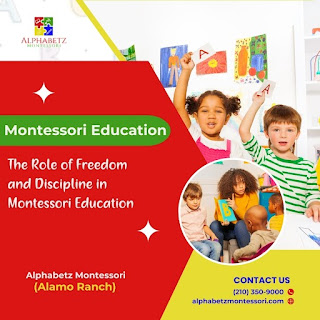The Role of Freedom and Discipline in Montessori Education
At Alphabetz Montessori, San Antonio, TX, we embrace the Montessori method, which emphasizes the importance of freedom and discipline in a child’s educational journey. In this blog post, we will explore how the balance between freedom and discipline creates a nurturing environment for children to thrive and develop essential life skills.
The Montessori Philosophy:
The Montessori philosophy believes that children have an innate drive to learn and explore their environment. They are natural seekers of knowledge and have an inherent desire to become independent individuals. The Montessori approach recognizes the significance of providing children with freedom within a structured environment to facilitate their holistic development.
Freedom in Montessori:
Freedom in a Montessori classroom is not about allowing children to do whatever they please. Instead, it refers to granting them the freedom to choose their activities and take ownership of their learning. This freedom empowers children, fosters their sense of responsibility, and enhances their self-esteem.
Within a Montessori classroom, children have the freedom to select activities from a carefully curated range of materials. These materials are designed to be self-correcting, allowing children to learn from their mistakes and develop problem-solving skills. By encouraging children to follow their interests, Montessori education promotes intrinsic motivation and a lifelong love of learning.
Discipline in Montessori:
Discipline, in the Montessori context, is not synonymous with punishment or control. Instead, it is about self-discipline, self-control, and respect for oneself, others, and the environment. Montessori classrooms provide children with a structured and orderly environment that supports their development of the discipline.
One key aspect of the Montessori discipline is the concept of “normalized” behavior. Normalization occurs when children develop inner discipline, focus, and concentration. Through engaging in purposeful work and activities, children develop their ability to concentrate for extended periods, leading to self-discipline and a sense of inner order.
The Role of the Montessori Teacher:
In a Montessori classroom, the role of the teacher is that of a guide and facilitator. Teachers observe and understand each child’s unique needs, interests, and abilities. They provide individualized guidance and support, promoting the development of self-discipline and independence.
Teachers create a prepared environment that encourages freedom of choice while maintaining structure and order. They introduce materials and activities based on each child’s developmental stage, ensuring that they are challenged and engaged. The teacher also models respect, kindness, and empathy, cultivating a positive and nurturing classroom community.
Benefits of Freedom and Discipline in Montessori Education:
The balance between freedom and discipline in Montessori education offers numerous benefits for children. By granting them freedom of choice, children develop decision-making skills, learn to prioritize, and become responsible for their actions. The structured environment promotes order and helps children develop a sense of self-discipline and concentration.To know more please contact us at https://www.alphabetzmontessori.com/contact-us.html or visit-
Website: https://alphabetzmontessori.com/
Facebook: https://www.facebook.com/alphabetzmontessori/
Instagram: https://www.instagram.com/alphabetz_montessori/
Call us: (210) 350-9000, (210) 993-5577


Comments
Post a Comment